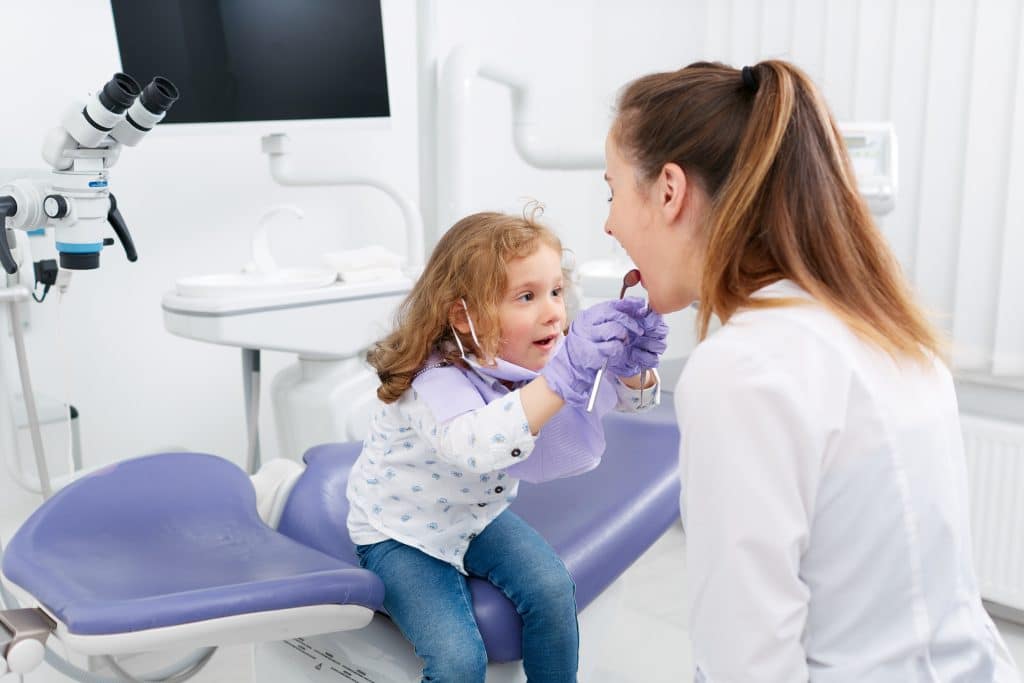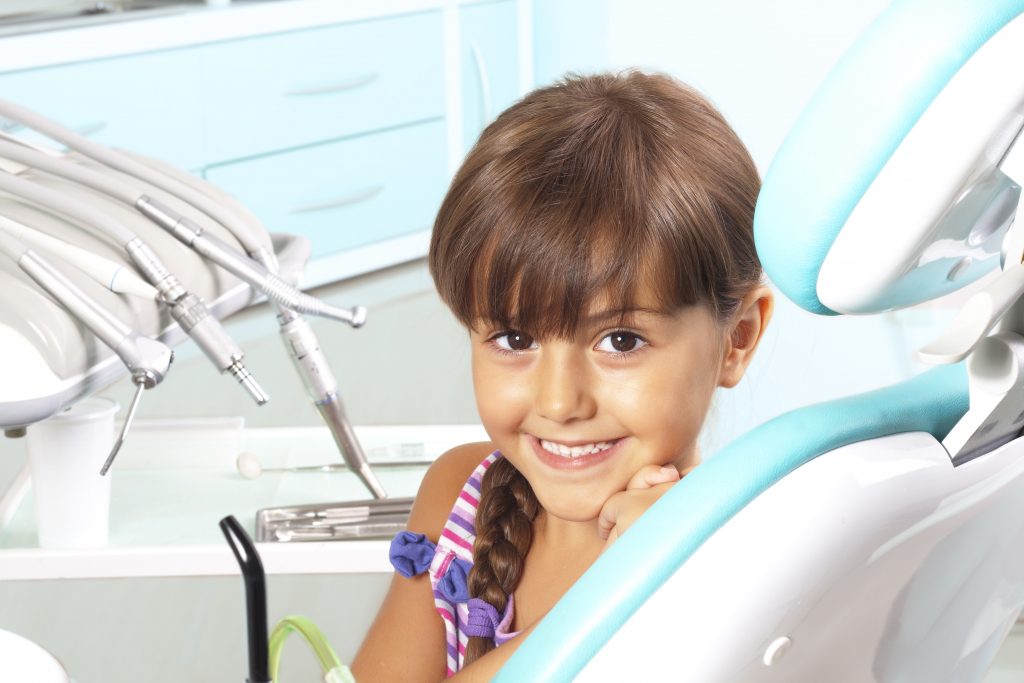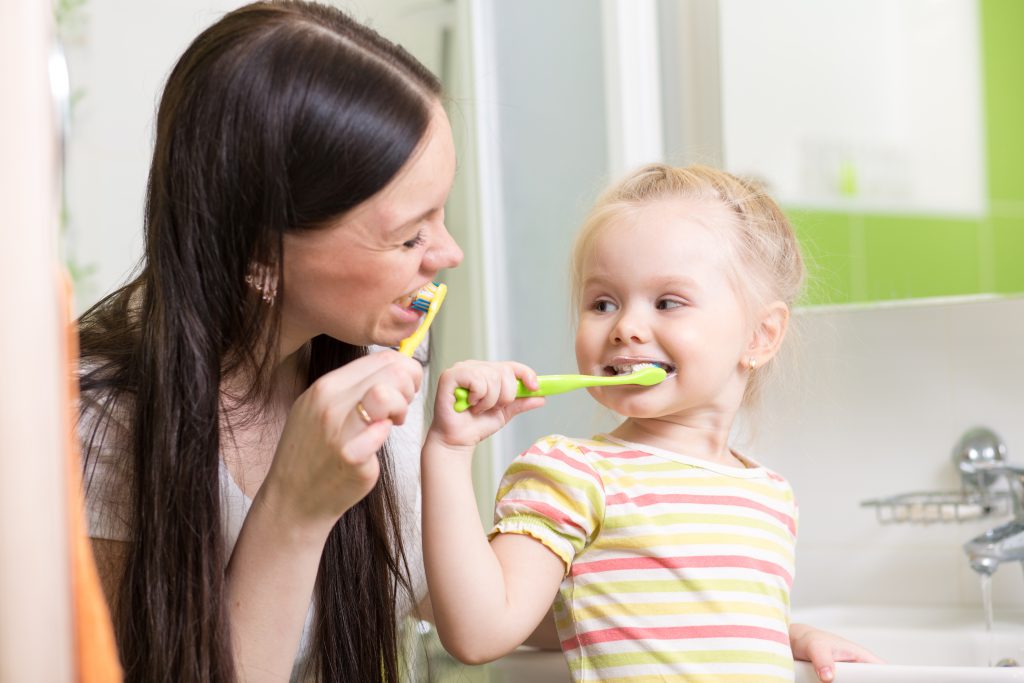February is National Children’s Dental Health Month
Did you know that February is National Children’s Dental Health Month? Teaching children how to take care of their teeth helps them to continue good oral hygiene habits as they grow into adulthood. While the tooth fairy may be the first positive dental role model kids get excited about, there are also additional ways parents can influence good oral health habits for their kids. Thankfully, 5Points Advanced Dentistry has extensive experience with making dentistry a positive experience for children.
When and how should I begin teaching my child to brush their teeth?
Once you see that your child’s first tooth has emerged, you should begin brushing for them daily. It’s important to help with brushing twice per day using a tiny drop of fluoride toothpaste that’s about the size of a grain of rice. Use a small, child-size toothbrush with soft bristles to minimize irritation or discomfort.
When your child turns three, it’s recommended that you increase the amount of fluoride toothpaste used during brushing to the size of a pea. Do your best to teach your child not to swallow the toothpaste. Young kids often have a hard time with rinsing and spitting, so gently remind and encourage them each time to try and rinse and spit until they start to get the hang of it.
It’s advisable that parents supervise children while brushing until at least 6-8 years of age. While brushing, help them gently and thoroughly clean all their teeth, inside and out, up and down. There is no specific method of brushing that’s been found to be better than another, so just focus on trying to clean all their teeth as thoroughly and gently as possible.
Sometimes young children tend to focus only on brushing their front teeth since they are easiest to reach. You can make a game out of it by saying something like, “Let’s see if you can find and brush all the hidden teeth in the back too.” It’s important to be patient and to keep it as positive, fun and even silly of an experience as it can be.
What can I do to teach my child good oral hygiene and make it a positive experience?
When you purchase toothpaste for your child, you may want to consider one with fluoride cavity protection. Look for kid-friendly, colorful toothbrushes, dental floss, and toothpaste packaging to make it fun, and experiment with different toothpaste flavors if your child doesn’t like mint. Teach them how to gently and thoroughly brush their teeth twice per day, as well as how to floss. Consider using star charts and other positive reinforcement to encourage consistency. If they forget or miss a day, go easy on them and help them get back on track so that brushing their teeth with you becomes a warm, bonding moment while caring for their teeth.
While kids often love to eat sweets and drink soda, it’s important to teach your children while they’re young to enjoy sweets in moderation in order to avoid cavities and other negative health effects. Bring your child to our office every 6 months for a dental examination, X-rays and a thorough cleaning to remove plaque and tartar.
How do I know if my child needs braces?
Permanent teeth start growing in or erupting, at around age 7 for most children. However, there is growing evidence that intervention may be needed much earlier than that. For example, at Stanford University, doctors are starting orthodontics and palatal expansion as young as 2 years old! Your child’s face and jaws are growing and developing all of the time, and small changes at a young age can make a big difference in their airways down the road. At your child’s bi-yearly exams, Dr. Imm will look for evidence of an over/underbite and/or overcrowded, misaligned teeth and will recommend a visit to an orthodontist, if necessary. Orthodontic treatment such as braces, or even Invisalign First, can help correct many of these issues. However, starting the process early doesn’t mean that your child will necessarily get braces right away. A qualified, compassionate and attentive dentist, like Dr. Imm can help determine the best plan on a case-by-case basis so it’s best to contact us at 5Points Advanced Dentistry for an appointment.
Are there any other resources you recommend that can help make dental hygiene fun for my child?
As mentioned above, February is National Children’s Dental Health Month, and the American Dental Association (ADA) has developed a number of great posters, puzzles and other free assets that can be printed and placed around your home to encourage good oral hygiene for your child. You can learn more by visiting the following link to the ADA website:
https://www.ada.org/en/public-programs/national-childrens-dental-health-month
What does the ADA say about Children’s Airway Health?
In August of last year, the ADA hosted the first-ever Conference on Children’s Airway Health. Dentistry is just starting to help improve children’s airways, and Dr. Imm is helping lead the charge! As a mentor at Spear Education’s Airway Prosthodontics Workshop, Dr. Imm is your local expert at helping your children grow and breathe. If your child snores or has any other sleep issues, make sure you let Dr. Imm know, so he can get you going down the right path!
Where can I find a dental team who will be gentle with my child?
If you are in the Columbus, OH area and are looking for an experienced, warm and compassionate dental team you can trust, you’ve come to the right place! At 5Points Advanced Dentistry, we are proud to offer a warm and compassionate experience for your child that is also affordable and excellent. We have a dedicated team who have worked with countless children and are committed to providing your child with a friendly, comprehensive dental plan and family-like care. Dr. Imm is compassionate and attentive and our staff will do whatever it takes to make your child feel at home. We will be with your child every step of the way.
My child is nervous about visiting the dentist, what do you suggest to help?
We completely understand being afraid of the dentist is common and normal among young children (and even adults!), which is why we provide a warm and compassionate experience. If your child is suffering from dental anxiety we suggest the following:
- Start young – the earlier the better
- Keep it simple – “They’re going to check your smile and count your teeth”
- Consider a pretend visit
- Do not try to relate
- Avoid bribery
- Emphasize the importance of good oral hygiene
When you come to see us, we will do everything we can to make him/her feel comfortable.
How can I get started?
If you are ready to help your child develop good oral hygiene habits for life, give us a call at 5Points Advanced Dentistry today. Don’t wait any longer, take the first steps to give your child the gift of a beautiful smile that he/she will be proud of and ready to show off.




